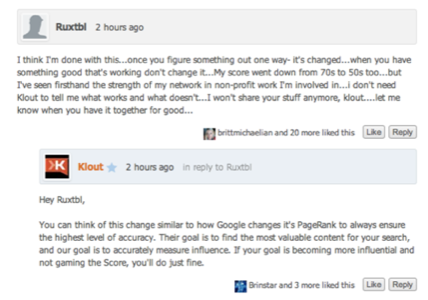Today Klout released a new scoring model for its social media influence service. According to a blog post, this project “represents the biggest step forward in accuracy, transparency and our technology in Klout’s history.”

Klout Score is based on the PeopleRank algorithm, which gathers information about how many people you influence, how much you influence them and how influential they are.
“Influence is the ability to drive action and is based on quality, not quantity,” writes Klout Director of Ranking Ash Rust. “When someone engages with your content, we assess that action in the context of the person’s own activity.”

Klout Score collects data from your Twitter, Facebook, LinkedIn, Foursquare, Google+ and WordPress accounts in order to determine your overall social media influence.
But how it calculates your score based on the data is unknown. In his blog post “The Trouble with Klout,” long-time technology journalist Paul Gillin writes:
Klout uses a proprietary algorithm to estimate influence based upon comments, retweets, @replies and mentions, among other things. The company isn’t very transparent about how it calculates the score, and with good reason. The algorithm is a competitive asset and disclosure would inevitably invite people to manipulate the system.
He concludes by stating that “Klout essentially asks customers to put their faith in the service to do the right thing.”
What Is Influence Measurement, Really?
Let’s not forget that Klout measures algorithmically derived data points. It does not account for its users offline influence, or any digital influence that isn’t expressed on social media. Are critics of Klout missing the big picture? Jay Baer says yes, they definitely are.
Klout should be used directionally and for trending purposes, not adhered to slavishly. It’s one piece of information that needs to be combined with (ideally) several others to do social CRM well. After all, the most important thing to know isn’t online “influence” but historical relationship between that customer and your company, and their corresponding lifetime value…I fear that lazy companies use it as a replacement for sound CRM and database marketing initiatives that bolt together multiple data points for better business intelligence.
Klout Scores Keep Dropping, Users Get Angrier
In the comments section below the post, angry users are shouting that Klout has assigned a higher importance to Facebook than it gives to Twitter. Klout responded, stating: “We measure influence equally on every network. We care about your influence over your audience — not the network you influence them in.” Here’s another conversation between a user and Klout, suggesting that their algorithm updates are nothing to quibble over.

Klout has flaws. So who cares if your Klout score just dropped? That’s pretty vain.
















